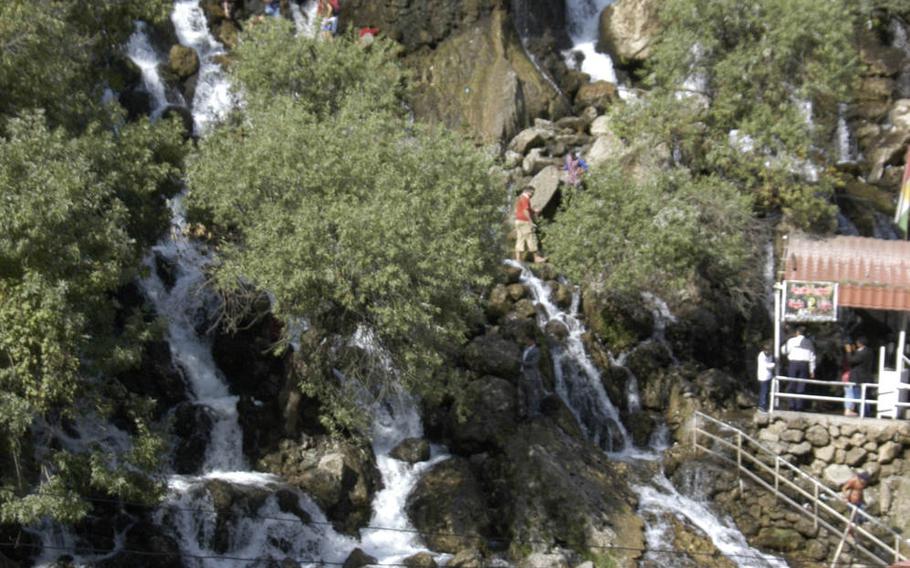
Tourists climb a waterfall in Iraqi Kurdistan in late October 2015. (Seth Robson/Stars and Stripes)
IRBIL, Iraq — Tourist buses snake their way through the gorges of Iraqi Kurdistan, bringing visitors to its picturesque mountains that have long been a popular holiday destination for Iraqis.
At roadside rest areas, wedding parties pose for photographs, and picnickers lounge beside gushing waterfalls and babbling brooks.
It’s a scene that would boil the blood of any fighter from the Islamic State, the militant group whose forces still occupy a front line two hour’s drive from the Kurdish capital of Irbil.
In the city, on Friday nights, groups of young Muslim men — whose families frown on drinking — park their cars along the main roads and sit on rugs beside them sipping beer or something harder.
Bars, shops and restaurants in the capital’s Ankawa district still bustle in the evening despite continuing unease about the militants, who advanced last summer to within 25 miles of the city before being driven back by Kurdish peshmerga fighters. The peshmerga have been a key ally of the United States in its aerial campaign against the Islamic State in Iraq since the militants overran much of the country’s western and central regions, including the second-largest city of Mosul, west of Irbil.
Thanks to the combined aerial and ground assault, Islamic State forces have been driven out of Kurdistan, where pro-Western attitudes dominate the more fundamentalist views found elsewhere in Iraq and other parts of the Middle East.
The past decade had been prosperous for Kurdistan, which recovered rapidly from decades of oppression by the regime in Baghdad and a civil war in the 1990s. Oil revenue has put money in Kurds’ pockets and prompted the construction of a slew of hotel and tourism ventures.
The mountains of Kurdistan offer a variety of resorts and recreation opportunities for those wishing to escape the city.
The drive alone is worth a trip to view the rocky cliffs and gorges. On a recent weekend at Pank Resort-Shnglbana, a popular holiday spot in the Kurdish mountains, families took in the scenery, shopped for souvenirs and rode a “roller coaster” that carried thrill-seekers along the edge of a steep cliff.
A group of male and female students sat on the grass playing a game with plastic tokens called “OK,” eating biryani (spicy meat, rice and vegetables) and kofta (meatballs) and drinking hot tea.
Soran University computer science student Sarwan Surchi, 21, said he hopes to work for a Kurdish telecommunications company when he graduates. He has no plans to head overseas — as tens of thousands of Iraqis have done in recent months.
“The Islamic State is a problem but the peshmerga are strong enough to keep them out of Kurdistan,” he said.
Nearby, the Korek Mountain Resort and Spa, at an altitude of 6,500 feet, is reached via a 2.3 mile-long gondola from near the city of Rawanduz. Iraq’s first ski area, when it opened last year, includes 132 guest villas, ski and snowboard rental and a lodge that wouldn’t seem out of place in Aspen.
In summer, sightseers ride the gondola to enjoy the view or try out some of the amusement-park-style rides at the top of the mountain. However, there are only a few customers riding the lift these days.
”Business here is really down because of this Islamic State problem,” said the resort’s director, Ajit Chandel, 38.
Visitor numbers have dropped 60 percent since last year, said Chandel, an Indian who was head-hunted for the job while working at a hotel in Nepal.
Tourists from Baghdad can still bus to Kurdistan but they have to go through many checkpoints because of the Islamic State threat, he said.
Despite the downturn, the resort is improving its ski slope with a new “magic carpet” lift for beginners and a tractor that will ferry more advanced skiers and boarders to higher slopes, he said.
“We are hoping for the best,” Chandel said. “If the Islamic State problem is solved this will be a very good business.”
One of those enjoying the views on Korek Mountain late last month was Irbil businessman Aziz Hager, 33. The workshop manager with a vehicle import company recently returned to Kurdistan after moving to Britain with his parents as a child.
Most of the people coming to the mountains these days are from Iran or Baghdad. Kurds, many of whom are government workers, have gone without paychecks for months and are staying home, Hager said. Over the past year, the Kurdish economy has suffered badly due to falling oil prices and a budget dispute with Baghdad.
“People with money are scared to spend it,” he said.
robson.seth@stripes.com Twitter:@sethrobson1